

VCE English: Advice for your Oral Presentations
Wednesday 19th, July 2023
As part of your assessment for VCE English, you are required to ‘ develop and present a point of view text.’ In other words, you need to complete an oral presentation. This is quite unlike the other assessments you get, as you are required to plan, write, and present a speech.
Most students find this assignment daunting, but it can also be very enjoyable as you get to explore a current issue (more on this later). This article will give you a run down on what to expect from this assessment, and tips and tricks to help you ace it!
How to Choose a Topic
The most important part of this assessment is choosing a suitable topic. VCAA stipulates that the issue must have appeared in the media before September 1 st of the previous year. In some cases, your teachers may give you a short list of topics to choose from, or if you’re lucky, you will be given completely free reign.
Either way, you need to choose a topic that you have a lot to write about. After all, you do need to talk for around five minutes!
Start by making a list of some significant events that appeared in the media in the last year. You can use news articles to help with this! Using these events, see if you can brainstorm the issues that occurred. Of course, there are multiple issues that can stem from a single event. You can use these to come up with some topics, for example:
|
|
|
|
| COVID Lockdowns | Businesses were struggling to stay afloat | Was the economic impact of the COVID lockdowns worth it to suppress the disease? |
| Australian Bushfires | Firefighters are volunteers but are required to work a huge number of hours in bad bushfire seasons. | Should the volunteer firefighters be paid for their time? |
| Lots of teachers have been quitting their jobs within the first five years of work. | Not enough teachers to maintain schools. | Should the minimum wage for teaching be increased? |
To help decide your final topic, brainstorm some arguments for each one. You should choose the topic that has the strongest arguments, and the one you will have the most fun writing.
Advice for Writing your Speech
It’s a given that the most important part of this assessment is writing the actual speech. Before you begin writing, make sure that you have done a lot of research into the topic, have plenty of evidence, quotes, and a rough plan. Here are some other tips:
Have a structure
Your listener needs to be able to follow along with your speech – therefore, you need to have a clear structure. They should know when you are starting a new argument or reading out your conclusion.
The best way to introduce your arguments is by signposting. You should have about 2-4 of them. This is when you very clearly state what your argument is before you begin discussing it (think topic sentences).
Your speech should also have a clear introduction and conclusion. Your introduction should also contain your contention, so your listener knows what your perspective is. Make your contention specific and unique!
Start with a bang
The very first sentence that you read out sets the mood for the rest of your speech. Therefore, you should start with an engaging hook to keep your listener’s interest. Some good ways to start are a speech are using analogies, anecdotes, or a shocking fact or statistic.
Do you need a persona?
Taking on a persona is a unique way to present an oral presentation. This is where you put yourself into someone else’s shoes and write in their perspective. Usually this will be someone that is more heavily involved in the issue than you are.
Perhaps you are writing about the ethical use of Artificial Intelligence software such as ChatGPT. You could write as a University Professor who is concerned about plagiarism or as a student finding it useful for studying.
You don’t have to use a persona – you can do just as well without one. It also fits certain topics better than others. If you choose to use one, make sure you do lots of research to understand the character, and make it clear to your audience who you are.
Think about your overall register/context
Depending on your topic and persona, there may be a certain register than suits your speech. Register refers to the level of formality and really depends on the context.
If you are presenting a speech in front of work colleagues, you may require a formal register. However, if you are presenting a speech in front of primary school children, an informal register will be best to keep their attention. Of course, you will be presenting your speech in front of your classmates/teachers. However, depending on the persona you adopt, you can change your register to suit.
Inclusive language is important
When writing a speech, you need to connect with your audience and really try and show them that the issue impacts them in some way or another. Therefore, try and use inclusive language where possible!
Tips for Presenting Your Speech
The job isn’t over once you have written your speech – you then must present it! Here are some tips to help you with this part.
Time yourself
It is likely that your teachers will set a time limit for your presentation. Usually it is around 5-6 minutes, which is equivalent to around 750 words. Before the day of your presentation, it is important that you practise the speech in timed conditions.
This will tell you if you need to cut and change parts of the speech and prevent you from getting penalised.
Vary your tone
Your voice is a very powerful tool – by changing the tone of your voice, you can add emphasis and draw attention to specific parts of your speech. No one wants to hear you speak in the same voice for five minutes straight – this shows a lack of enthusiasm and passion towards the issue. Change your tone to match what you are saying – does a certain part of your speech make you angry, frustrated or even sad? Show this through your voice! You can also change the pace that you are talking at and change up your volume.
Make cue cards but don’t rely on them
A cue card is a small piece of paper that has words written on them, that tells you what you need to say. This is much preferred to reading off a sheet of paper! Although they are very useful, you shouldn’t rely on them – your marker doesn’t want to see you staring at them for the entire duration of your speech. Therefore, make sure you practise your speech enough times so your cue cards become your safety net in case you forget something – not what you rely on completely.
Don’t forget to make eye contact
Giving eye contact is a sign of confidence and connects you to your viewer. Make sure you regularly look up from your cue cards and don’t take your eyes away from your audience for too long.
Body language is important
Just like varying your tone, physical actions can help enhance your presentation too. Don’t stay rooted to a single spot during your presentation, feel free to walk around a bit and use hand gestures. Don’t overdo it though!
Hopefully you found this article helpful and are now feeling more confident about completing your oral presentation. Just make sure you choose a topic that you are passionate about and practise your presentation as much as possible – you can certainly ace this assessment!
Featured Articles

Your Common Study Questions Answered!
Need some advice on how to study? Confused on the best ways to approach certain topics? Here are your common study questions answered. Is it better to handwrite or type notes? B...

What does it actually mean to “study smart”?
When I was in high school, I was often told to “study smart, not hard”. It’s a common high school trope and, to be completely frank, I didn’t know what it m...

The benefit of asking questions in high school
For whatever reason, asking questions through class can actually be pretty tough. Maybe you feel embarrassed about not knowing the answer. Maybe you haven’t yet developed rap...

How to study in high school - the 'dos' and 'don'ts'
As we know, different students study in different ways, and that’s totally fine. This article isn’t prescriptive - we’re not telling you what must be done - but w...

VCE English Issues: Oral Presentation
- 2022 issues
- Persuasive Writing
- Oral Presentation
- Evaluate Sources
- Bibliography

What is an Oral Presentation?
Making a good oral presentation is an art that involves attention to the needs of your audience, careful planning, and attention to delivery. You can make an oral presentation for a number of reasons:
- to inform
- to persuade
- to entertain
Terminology
Colloquialism
A colloquialism is a word, phrase, or other form used in informal language. Colloquialisms include words, phrases such as "raining cats and dogs" and "dead as a doornail"; and aphorisms such as "There's more than one way to skin a cat".
Voice Register
Fallseto - talking through nose and throat. Talking in a lower voice makes your presentation carry more weight.
The way that your voice feels. Rich smooth and warm.
Having a question sound like a statement or a statement sound like a question. Prosody is the patterns of stress, intonation and rhythm of oral language.
How fast or slow are you talking? Using silence to place emphases a point that you have just made. The audience will stop and think as well.
Same sentence can mean different things if you use a different pitch.
Build your oral presentation skills
Tips and Hints
- LaTrobe University Guide
- Tips on How to Deliver a Speech for School or Work
- Top 10 Public Speaking Exercises Tips and hints to improve your public speaking skills
- 12 Ways to hook an audience in 30 seconds
- Ten Simple Rules for Making Good Oral Presentations
- A Quiet Person's Guide To Effective Public Speaking
Watch " How to give a great TEDx talk" for some great tips on how to structure your talk.
Although the video is specifically geared towards delivering a TED talk, there is plenty for VCE students to take away.
- Make sure you use a strong opening hook .
- Order your points so they follow naturally in the sequence of your talk.
- Craft a great closing story with a call to action.
- Add images to help tighten transitions and augment your stories.
- Rehearse and practice in front of real audiences for several weeks
Click here for: Strategies for an effective oral presentation
Please visit your Teacher Librarians for help preparing your 'oral'. Don't leave a practice session to the last minute. Come early and we can endorse or improve. Teacher Librarians can help with:
- Researching your topic
- proof reading your written piece
- practising your presentation
- presentation design
- moral support
- << Previous: Persuasive Writing
- Next: Fake News >>
- Last Updated: Jun 15, 2023 4:18 PM
- URL: https://materchristi.libguides.com/issues

VCE English Oral Presentation: Oral Presentation Tips
- Accessing Media articles
- Oral Presentation Tips
- Referencing
- Graphic organisers
Website Tips
- RMIT Read these helpful tips on delivering your oral presentation.
- Lisa's Study Guides Advice for A+ Oral Presentations
- Insight Read How to write a good oral presentation on a point of view
- Deakin University Year 12 English - tips for oral presentations
Great Speeches
- Julia Gillard
- GretaThunberg
- Emily Blunt
- First Indigenous Female Senator
Oral Presentation Tips on Video
- Raw 50 Oral Presentation tips
- Quoting and Referencing in your speech
- Atar Notes Oral Presentation
- Public Speaking Anxiety Tips
- Tips to overcome Public Speaking Anxiety
Marian College Resource Centre

- << Previous: Accessing Media articles
- Next: Referencing >>
- Last Updated: Aug 28, 2024 8:47 AM
- URL: https://mariansw.catholic.libguides.com/vceoralpresentation

- Study Notes
- Latest News
- Our Mission
- Get in touch!
VCExpert: Power Up Education ⚡
Sign-up to our free weekly newsletter, get the latest vce tips & resources straight to your inbox for free, (we promise we won't spam you 😉).

VCExpert Partners

VCExpert E-Learning Platform
- Back to homepage
- VIC School Finder
- Create a Free Account
- Privacy & Terms
- Ethical use of AI

- 📂 Introduction
- 📂 Author's Background
- 📂 Literary Elements
- 📂 Characters
- 📂 Relevant Vocabulary
- 💡 Essay Topics
- 💯 Sample Essays
- Member Area
- VIC School finder
- Ethical use of Ai
Please login or create a free account :)

VCE Oral Presentations: Oral Presentation
- Oral Presentation
Tips and Tricks
- Oral Presentations: Tips on How to Deliver a Speech for School or Work
- Top 10 Public Speaking Exercises
- 12 Ways to Hook an Audience in 30 Seconds
- Ten Simple Rules for Making Good Oral Presentations
- A Quiet Person's Guide To Effective Public Speaking
What is an Oral Presentation?
Oral presentations, also known as public speaking, consist of an individual or group verbally addressing an audience on a particular topic .
There are four reasons you would give a presentation:
- to educate,
- to entertain
- to present an argument.
How Can the Library Help You?
Visit the library team for help with the following:
- Researching your topic
- Proofreading your written piece
- Practising your presentation
- Presentation design
- Moral support
Five Basic Public Speaking Tips 5:01
How to Speak so that People Want to Listen 9:58
TED's Secret to Great Public Speaking 7:56
Five Simple Rules for Creating World Changing Presentations 4:28
- Next: Resources >>
- Last Updated: Sep 6, 2023 3:17 PM
- URL: https://geelong.libguides.com/vce_english_orals

#1 Victorian uni for graduate employment 1

#1 in the world for sport science 2
#1 Victorian uni for course satisfaction 3
For career and life, this. gives you practical advice to help you on your journey.
- Self-improvement
Curious about this. ? Find out more
Have something to share? Contact us

Year 12 English: tips for oral presentations
Related articles.


Quiz: what type of online student will you be?

How to set successful goals in VCE

How to best handle stress
We all know oral presentations are a big deal in year 12. Your mark makes up a significant proportion of your final study score in VCE English. Your Point of View speech is worth 40% of the grade awarded for Unit 4 alone.
Juliet Austin, lecturer at Deakin University’s Faculty of Arts and Education, and Jason Jewell, Year 12 English teacher at McKinnon Secondary College, share their top tips for nailing your oral presentation.
Research and plan
To set yourself up for success, start by conducting thorough research into what makes a great speech. This will help you ensure the script of your speech has plenty of interesting, powerful and persuasive language devices, Jewell says. ‘You should listen to speeches such as TED Talks and observe politicians in the media – all of which model effective verbal and non-verbal communication skills aimed at persuading a target audience.’
Austin suggests a great way to cut down on stress is to ensure you’re well prepared ahead of time and have a really clear understanding of the task.
‘You know your dates in advance, so check with your teacher and make sure that you’re really clear about what you have to do and what materials you can use,’ she advises.
When it comes to drafting your speech, it’s important to make sure your presentation has a structure, Austin says. ‘You really have to have your audience in the back of your mind. What’s interesting to them? What grabs their attention?’
Cue cards can be a great tool, but Austin says they can also be a major distraction. ‘Take some time to figure out if you really need every word written out or just dot points. You know how you work best,’ she says.
'‘You really have to have your audience in the back of your mind. What’s interesting to them? What grabs their attention?’' Juliet Austin, Deakin University
Practice makes perfect
Jewell suggests recording yourself delivering the full version of your presentation in order to identify any ways you could improve.
‘You need to practice your speech a great deal before the actual task in class, so that you do not rely on notes or cards too much and can speak directly to all members of the audience using your eyes, facial expressions and gestures, to show them how passionate you are about the contention you have chosen,’ he says.
Remember that it’s common to speed up when you’re nervous.
‘Ensure your stance is confident, including enough pauses between points, stressing words for effect, using visual materials and not speaking too quickly,’ he says.
Austin says you might also need to take into consideration the classroom you will be delivering your presentation in. ‘Have a think… do I need to project myself louder if I’m in a wider room?’
Back yourself up
We’ve all done it. The night before your presentation, you’ve dissected your work with your classmates, leaving you feeling insecure and unsure of your hard work.
‘Don’t stay up all night the night before. You need to be fresh. The worst thing you can do if you’re feeling anxious is stay up all night comparing presentations,’ Austin warns.
‘Try not to also hang around too much before your presentation with other nervous people. There’s no need. Afterwards, don’t feel like you have to engage in a deep post mortem discussion about how everyone went. Once it’s done, it’s done. No need to hash over it.’
And her number one tip? ‘Don’t forget to smile!’
Want more tips?
Here’s what high-achieving Year 12s have to say.

Lecturer, Faculty of Arts and Education, Deakin University
Read profile
Share this.
Explore more.

A Guide to Oral Presentation and Statement of Intention

Oral presentations can be incredibly daunting for students, and most of us are not the biggest fans of public speaking. To help you alleviate your stress in preparing for this SAC, we have created a comprehensive guide on this particular topic which includes some ideas to help you develop your writing, research and presentation skills! An annotated sample response is also attached for your reference.
- Choosing a Topic for your SAC
Researching Your Issue
Creating a contention, writing your speech, presentation tips.
- Sample Speech
Choosing a Topic for your Oral Presentation SAC
When selecting a topic for your presentation ensure, that there are clearly two sides to the issue. For example, the issue of whether or not Australia should implement a sugar tax has arguments both for and against. This means that you will have lots of opposing opinions to rebut!
Remember that the issue you choose must have appeared in the Australian media since September the 1st the previous year. When choosing an issue, try to base it around a specific event, proposal or something concrete. For example, the general topic of climate change is too broad, whereas writing about whether or not the school climate strikes (specific event) should be allowed to proceed, sufficiently narrows down the topic.
Further, make sure that the issue you choose will be interesting and understandable to your audience of teachers and VCE students. You should avoid topics which require you to use extensive jargon. Your audience is most likely to be captivated by a relatable topic that they care about and understand.
Make sure to phrase your issue as a precise question that you can answer in your contention. For example “Should Australia increase surveillance in an attempt to counteract terrorism?”.
If you are struggling to choose an issue the ABC News Archive is a good starting place. If in doubt, choose an issue which you are interested in! You are more likely to be motivated to spend time researching and writing on a topic that you care about.
Once you have chosen a topic make sure to conduct research before writing your speech! A good place to begin is by searching for coverage in popular news sources (The Age, The Herald Sun, The ABC, The Australian). Next, you may also want to use some lesser known but still reputable websites (The Conversation, A Current Affair, Q&A, 9 News, Insight, etc.). Make sure that you read articles arguing both for and against your contention.
As you read, note down any key arguments, quotes, pieces of evidence or persuasive techniques which you think may inspire or support your own speech. Once you have done this for 5–10 articles you should be ready to write! When writing, aim to go further than just synthesising the arguments that you have seen others present. Assessors are looking for your ability to create unique and convincing arguments, which are supported by research and evidence.
Your contention must be precise and concise. You should avoid contentions that are too broad or are already generally accepted in society, such as “climate change exists” or “hate speech is wrong”. An example of a specific and detailed contention is “Australia must allow punters to test their pills at music festivals and the police to operate in a similar way to the Sydney injecting centre where using drugs is not a crime.”
The Introduction:
Start with an opening sentence which grabs the attention of your audience. This could take the form of an anecdote, rhetorical question, quote, shocking statistic, etc.
- Establish the importance and urgency of your issue.
- Relate to your audience by using inclusive language.
- Clearly state your contention and briefly summarise your arguments.
If you are taking on a persona use some time to introduce yourself. Taking on a persona is recommended so that you can establish your credibility and stake in the issue. When choosing a persona keep in mind that if you choose to speak as a professional person (politician, lawyer, doctor, etc.) you should consider the type of jargon and formal language that they may use.
- Be sure to vary your sentence length. Short sentences are usually more impactful than extended ones.
- Define any key terms.
The Body Paragraphs:
Begin and end each body paragraph by clearly signposting your argument.
Your paragraphs should be made up of evidence and explanation that supports your argument.
Aim for a balance between appealing to the audience’s sense of logic (with evidence, appeals to common sense, expert opinion, etc.) and appealing to their emotions (with emotive language, anecdotes, connotations and rhetorical questions).
Make use of a variety of persuasive language techniques! Take inspiration from the techniques used in the articles you found during the research stage.
Utilise words with connotations, or implied meanings, in order to influence the audience’s perception of the issue. For example, if you were arguing for graffiti to be considered as art you may refer to it as “street art”, whereas if you were arguing for it to be considered a criminal offence you may describe it as “vandalism”.
Acknowledge the potential arguments of the opposition and then rebut them. You can include this rebuttal throughout your essay or as a final paragraph dedicated to criticising your opposition.
The Conclusion:
- Restate your contention and briefly summarise your arguments.
- Remind the audience of why the issue is important and how it relates to them directly.
Your conclusion must end in a memorable way to ensure that your speech stands out to the assessor and remains on their mind after its conclusion. You may choose to do this with a rhetorical question, quote, statistic, anecdote, etc.
Ensure that you make eye contact with various members of your audience and look around the room. Raise your cue cards so that you don’t need to look down too far to see them.
Whilst presenting your speech try to stand still and avoid swaying or pacing. Use your arms to make natural gestures; however, do not overdo this.
Read your speech aloud to your family or friends to practice your delivery. Another option is reading your speech in front of a camera or mirror. Aim to practise the speech until you have it memorised.
Make sure to vary your tone when presenting. Pause after making an important statement and emphasise elements that you want the audience to pay attention to with volume and tone. Variation will make your speech more engaging for the audience.
Make sure to time your speech to ensure that it is within the time restriction. Also ensure that you are speaking at a slightly slower pace than usual so that the audience can follow your points easily.
If speaking with props or a Powerpoint presentation, avoid overcomplicating your materials. You don’t want to distract the audience from your speech by overwhelming them with busy Powerpoint slides, or bore them by simply reading straight from your presentation.
The Written Explanation
The written explanation gives you an opportunity to explain the choices that you have made when writing your speech. Often these statements have a strict word limit usually around 400–500 words (depending on your school), which means that you need to be as concise as possible. The written explanation is worth 25% of your mark for this outcome, so make sure that you take it seriously. When writing your statement of intention you can follow the structure outlined below.
Provide a brief description of your issue and any specific events which sparked media coverage.
Contention:
Clearly state your stance on the issue. You may also like to include why you have chosen this stance.
Outline where and when you will be presenting your speech and why you have made this choice. If you are taking on a persona explain who you have chosen to speak as and why.
Select a target audience which is suitable for your presentation. Describe why you have chosen to present to this specific group of people.
Consider the overall language style you have used (formal, informal, personal, etc.) and the persuasive language techniques you have incorporated (repetition, comparison, connotations, etc.). How do you intend for these techniques to influence your audience?
Outline what you want to achieve by presenting your speech. What is the message you would like the audience to receive? What is the desired outcome of your speech?

To download this, click here .
Related posts.
.png)
8 Things that took me from B+ to Premier’s Award in English

An Ultimate Guide to Crafting Texts

An Ultimate Guide to Analysing Plays

Your 2024 VCE English cheat sheets: Text summaries, key themes and approaches to genre

A Pocket Guide to Argument Analysis

Text Response: Identifying and Correcting Common Essay Errors

Creative Responses and Written Commentary (SOIs) Explained

The Ultimate Guide to the VCE English Study Design

English Study Designs are notoriously difficult to understand, let alone read. Following the introduction of the new VCE English Study Design in 2023 , we are going to unpack it in a simple, organised fashion, to help inform you of everything you need to know for VCE English.
We will go through each unit, outlining all the material knowledge, skills and topics that are vital to your VCE English journey.
VCE English Study Design Structure Key changes from the previous VCE English Study Design Unit 1: Reading and exploring texts + Crafting texts Unit 2: Reading and exploring texts + Exploring argument Unit 3: Reading and respond to texts + Creating texts SACs for Unit 3 Unit 4: Reading and responding to texts + Analysing argument SACs for Unit 4

VCE English Study Design Structure
The 4 Units in VCE English are split up as follows:
Unit 1: Reading and Exploring Texts + Crafting Texts
Unit 2: reading and exploring texts + exploring argument, unit 3: reading and responding to texts + creating texts, unit 4: reading and responding to texts + analysing argument.
It is important to notice the correlation between Units 1 and 3, as well as Units 2 and 4. Although they have different titles, they are fundamentally the same.
Key Changes from the Previous VCE English Study Design
- The ‘Comparative Essay’ component has been completely removed from the Study Design.
- Creative Writing (‘Framework of ideas’) is now a component (‘Section B’) of the external examination for 3/4 English.
- You will write Argument and Language Analyses on written persuasive texts and persuasive pieces in another form (such as audio or visual) in 3/4 English.
This unit is generally your first introduction to Creative Writing, you will create or add to stories through a provided text or theme. Additionally, you will start writing VCE standard essays, which tends to be a surprise jump in quality expectations for many.
Area of Study 1: Reading and Exploring Texts (Essay Writing)
At the beginning of your VCE journey, you’ve likely been writing essays for a couple of years. Every student has at least gone through the process of analysing a text and then answering questions about it.
However, don’t underestimate this section, the study design often introduces students to new expectations and requirements for essay writing that can be difficult to achieve without extensive practice.
You will have to write an essay for assessment in this Area of Study. The VCE English Study Design Outcome outlines that you are assessed on:

– Extracted from the VCAA websites on the ‘Planning’ page
From this, we can gather that you are assessed on your ability to execute three skills:
- Context. This relates to how well your essay addresses the question you are responding to. This tends to be where English VCE students lose most of their marks. It is critical to ensure your whole response is catered towards the question.
- Knowledge. You need to show a deep understanding of the text’s characters, themes and author’s intent. This can be shown through your use of quotes, explanations and ultimate conclusions.
- Writing and Grammar . This is a skill that must be developed over the course of your schooling journey. I don’t want to sound like a broken record, but reading and writing is the only way to improve in this area.
Need to write an expert-level feature article for VCE English ? Here’s a few tips to help you ace the criteria sheet…
Area of Study 2: Crafting Texts (Creative Writing)

You will engage with a set of ‘mentor texts’, these are texts that align with a ‘ Framework of Ideas ‘ (overarching theme and ideas) created by your school. The mentor texts can be a range of different forms, such as short stories, speeches, and poetry. You will use these mentor texts to make a creative text of your own.
According to the outcome, you will be assessed on your ability to:
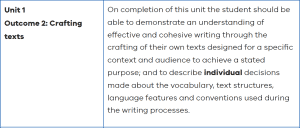
In summary, the creative writing task is based on your ability to:
- Create a text for a specific purpose. You must design your piece for a context and audience, and attempt to express, explain, reflect or argue.
- Demonstrate an understanding of the mentor texts. Your writing will need to be clearly influenced and guided by the mentor texts you investigated.
- Justify the decisions you made when writing the text. After writing your piece, you may be asked to create a description that explains why you took the text in the direction you did.
Unit 1 Assessment Summary
Wondering what you could be assessed on in this unit? Here are the types of assessments you can end up with for each Outcome:
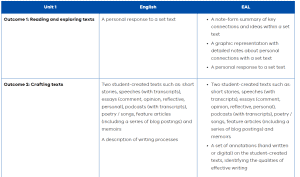
– Extracted from VCAA’s website under the ‘Assessment’ Page
Apart from more essay writing, this unit focuses on ‘Exploring Argument’. This involves analysing an opinionated piece and outlining why it does a good job at persuading the audience to agree with their proposal, also known as a language analysis. Additionally, you will perform an Oral Presentation on a chosen topic recently discussed in the media.
Area of Study 1: Reading and Exploring Texts (Essay writing)
This area of study is the exact same as Area of Study 1 in the previous unit. Don’t believe me? Well here is the outcome for this unit:

Sound familiar? In this Area of Study you will also be assessed on your essay writing .
Yes, there are slight differences in the key knowledge and skills sections between the two Area of Studies. However, these are simply to ensure teachers introduce you to different styles of texts for essay writing.
Additionally, these areas of study deliberately cover similar content! Thanks to the design of the curriculum, there’s nothing new to learn here, you’ll just need to continue to improve on your essay writing skills.
Area of Study 2: Exploring Argument (Analysis of Argument and Language)

Oral Presentation
The Oral Presentation aims to help you understand the thought process that goes behind making an opinionated piece. In the Oral, you will craft a speech that aims to convince the audience of a specific perspective on an issue.
You may have to perform an Oral Presentation on a topic that has recently been in the media for assessment . The Oral will assess:
- Public speaking skills. Good body language, clear articulation, and different tones of voice will be required.
- Argument building. How do you position the audience to eventually agree with your point of view?
- Knowledge of the chosen issue. Are you well versed in both sides of the argument? Do you have evidence to support your argument and refute possible weaknesses in your perspective?
Want help with your Oral Presentation? Have a look at The Comprehensive Guide to Acing your VCE English Oral Presentation.
Exploring Argument (Argument Analysis)
Language analyses are not the same as essays. Do not mix up the two, you must view them separately in order to do them both well. This task requires you to concisely unpack a persuasive piece which can be in written, audio or visual form.
The assessment will likely require you to write an Argument and Language Analysis on a persuasive piece . This is shown by the Outcome, which states:
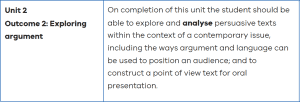
Generally, you will be marked on the following:
- Identification and exploration of techniques used to build the argument. How have language techniques, argument techniques, writing techniques and imagery assisted the writer or speaker’s argument?
- Understanding of the audience. How would the readers be influenced by the writer or speaker’s different techniques used in argument?
- Ability to display how the argument is developed. What is the writer or speaker trying to achieve throughout different points of their piece?
- Writing and Grammar. In a ‘language analysis’, you are expected to write extremely clearly and to the point, avoiding all the ‘fluff’ you would have in an essay.
Check out our full guide on How to Write an Argument Analysis for VCE English !
Unit 2 Assessment Summary
Curious about the assessments for this unit? Here are the types of assessments you can end up with for each Outcome:
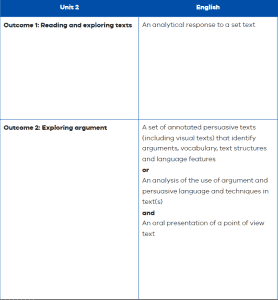
Area of Study 1: Essay Writing
Yep. You guessed it, this Area of Study is the exact same as the other two essay writing Areas of Study. This is shown by once again familiar outcome:

Area of Study 2: Creating Texts
In this Area of Study you will be building upon your skills learnt in Unit 1. Your school will select three mentor texts for you to read from a list provided by VCAA. These mentor texts now align with a ‘ Framework of Ideas ‘, you will explore one framework in extreme depth and write about it in a SAC and eventually the exam.
The Frameworks are as follows:
Writing about country Writing about play Writing about protest Writing about personal journey.
You will be assessed on the same skills as in Unit 1. Meaning you have design your piece to a specific context, audience and purpose, as well as explain your decisions made in the writing process.
This is one of your last chances to refine your skills before the English Exam. The text you write will be required to align with one of the four broad ideas which you can engage with in the exam. So, this can provide a strong foundation for your exam preparation!
Unit 3 SACs
Below is a table extracted from the VCAA VCE English Study Design. It outlines the SACs you will undertake during Unit 3 English. Outcome 1 is your essay writing SAC, Outcome 2 is your creative writing SAC.
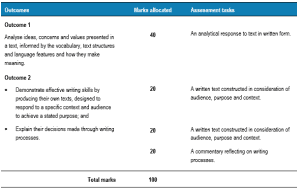
This is your final essay writing Area of Study for VCE English. It is important to realise that the standard of writing goes up with each Area of Study.
These more complex expectations are a main reason why you are expected to practice essay writing in each Area of Study. These expectations take a lot of practice to consistently achieve!
You should also note that the text you use in this Area of Study will very likely be the one you use in Section A (essay writing component) of the English Exam, as it will be the freshest text in your memory during the exam period.
Area of Study 2: Analysing Argument
Finally, the last area of study, and just like the rest of Units 3 and 4, you’ve already done this before! This section requires you to do language analyses and an Oral Presentation.
The Oral Presentation must analyse a form of media that has appeared since the 1st of September the previous year.
For the Argument Analysis, you will make one on a written text and another in a different form, such as audio or visual. You will be required to use the same skills as in Unit 2, Area of Study 2. Once again keep in mind that you will h ave to do a language analysis in Section C of the English Exam .
Unit 4 SACs
Below is a table extracted from the VCAA VCE English Study Design. It outlines the SACs you will undertake during Unit 4 English. Outcome 1 is another Essay writing SAC. Outcome 2 involves the Argument and Language Analyses SACs.
That’s all!
Th e VCE English Study Design may seem too detailed, a tad unnecessary or confusing. However, you will slowly realise throughout your VCE journey that it makes a lot more sense than what you originally thought. VCAA deliberately created this study design so that Units 1 and 2 of English prepare and essentially rehearse students for Units 3 and 4.
Therefore, make sure to take your Year 11 studies seriously! I promise that you will be grateful by the end of your English journey, if you take advantage of this well crafted Study Design structure.
Making the step up to Year 12? Here’s how to ACE it…
Are you looking for some extra help with working through the VCE English Study Design?
We have an incredible team of VCE tutors and mentors!
We offer specialised English tutoring in Melbourne with expert tutors ! Get in contact today to secure your expert coach.
We can help you ace your VCE English SACs and ace your upcoming VCE assessments with personalised lessons conducted one-on-one in your home or online!
Looking for a local tutor in Footscray ? Or needing support for the VCE in Doncaster ? We offer one-on-one tutoring, in your home or online!
We’ve supported over 8,000 students over the last 11 years , and on average our students score mark improvements of over 20%!
To find out more and get started with an inspirational VCE tutor and mentor, get in touch today or give us a ring on 1300 267 888!
Max Huyton is the VIC Growth Marketer for Art of Smart and a Laws and Commerce student at Monash University. In his other life, Max spends his time reading and writing whenever he gets the chance and cooking extremely mediocre dishes for friends and family.
- Topics: ✏️ English , ✍️ Learn
Related Articles
How to write a text response essay for vce english, how to write a captivating feature article (examples + structure), the 4-step exam preparation plan so you can ace your year 11 prelim english exam, 45,861 students have a head start....
Get exclusive study content & advice from our team of experts delivered weekly to your inbox!

Looking for English Support?
Discover how we can help you!

We provide services in

Private Tutoring
Oral Presentation
Keep in touch.
Have questions? Get in touch with us here - we usually reply in 24 business hours.
Unfortunately, we won't be able to answer any emails here requesting personal help with your study or homework here!

Copyright © Lisa's Study Guides. All Rights Reserved. The VCAA does not endorse and is not affiliated with Lisa's Study Guides or vcestudyguides.com. The VCAA provides the only official, up to date versions of VCAA publications and information about courses including the VCE. VCE® is a registered trademark of the VCAA.
03 9028 5603 Call us: Monday to Friday between 3pm - 6pm or leave us a message and we'll call you back! Address: Level 2 Little Collins St Melbourne 3000 VIC

IMAGES
VIDEO
COMMENTS
Oral Presentations - fun and full-scoring. Bet you've never heard those words in the same sentence before! As much as the Oral is a SAC that is often feared by many English students, I managed to come out of my presentation not completely terrified - I was actually able to somehow enjoy myself a little up there, and I might have even had a smile on my face when it was all done.
1. Your Oral Presentation SAC has two components. The first is the Oral Presentation itself ("a point of view presented in oral form"), and the second is a Written Explanation, also known as a Statement of Intention. 2. Your selected topic needs to be an issue that has appeared in the media since 1 September of the previous year. 3.
For many VCE English students, the oral presentation is the scariest part of the course; it's often also the first. ... 'I chose to adopt the conventions of a persuasive speech, where I use a structure of presenting my main ideas by rebutting arguments made by the opposition. Throughout my speech, I embed persuasive tactics in an effort to ...
The VCE English oral presentation is the assessment task which tests your knowledge and skills for Outcome 2 of Unit 4 in the Study Design.. Learn more about VCE SACs and VCE English SACs + the Framework of Ideas!. The focus is on your ability to construct a sustained and reasoned point of view on an issue currently debated in the media.. Note: An Oral Presentation may be required in Unit 2 to ...
ATAR Notes. VCE English: Advice for your Oral Presentations. Ranithri R. Wednesday 19th, July 2023. Share. As part of your assessment for VCE English, you are required to 'develop and present a point of view text.'. In other words, you need to complete an oral presentation. This is quite unlike the other assessments you get, as you are ...
Fallseto - talking through nose and throat. Talking in a lower voice makes your presentation carry more weight. Timbre. The way that your voice feels. Rich smooth and warm. Prosody. Having a question sound like a statement or a statement sound like a question. Prosody is the patterns of stress, intonation and rhythm of oral language. Pace.
Revision videos for VCE English Units 3&4. This series includes:- Annotating texts- Memorising quotes- Integrating quotes- Analysing characters- Analysing st...
Climate change refers to long-term shifts in temperatures and weather patterns. Human activities have been the main driver of climate change, primarily due to the burning of fossil fuels like coal, oil and gas. Oral Presentation Tips on Video. Lisa Tran. Raw 50 Oral Presentation tips.
Get the Latest VCE Tips & Resources straight to your inbox for FREE! Get in touch! VCExpert offers essential resources for VCE English oral presentations. Our comprehensive guides cover everything from speech writing and effective communication to presentation techniques, helping you gain confidence and skills to impress in your assessments.
Become an Academic Weapon with my 1-1 Coaching: https://jdacademic.com/Have your VCE English Oral Presentation coming up? This video covers how to undergo yo...
Year 12, 2020. Unit 3, Area of Study 1: Reading and Creating Texts. 30 marks. A creative response to a selected text in written or oral form with a written explanation of decisions made in the writing process and how these demonstrate understanding of the text. Note: This is an optional oral assessment.
Step 1: Select a topic that has appeared in the media since 1 September of the previous year. Getting started on this first part can be tricky, especially if you want to choose something a bit more original or fresh. In any case, the first thing you need is an event. An event in the VCE English context is anything that happens which also ...
Oral presentations, also known as public speaking, consist of an individual or group verbally addressing an audience on a particular topic. There are four reasons you would give a presentation: to educate, to inform, to entertain. to present an argument.
This covers the statement of intention for the oral presentation task for VCE English (one of the English SACs) . This is where you explain and justify your ...
We all know oral presentations are a big deal in year 12. Your mark makes up a significant proportion of your final study score in VCE English. Your Point of View speech is worth 40% of the grade awarded for Unit 4 alone. Juliet Austin, lecturer at Deakin University's Faculty of Arts and Education, and Jason Jewell, Year 12 English teacher at ...
Oral presentations can be incredibly daunting for students, and most of us are not the biggest fans of public speaking. To help you alleviate your stress in preparing for this SAC, we have created a comprehensive guide on this particular topic which includes some ideas to help you develop your writing, research and presentation skills! An annotated sample response is also attached for your ...
Below is a list of 12 potential Oral Presentation topics for you to draw inspiration from, selected in reference to the VCE assessment criteria. Remember, this blog is not a resource to give you a finished speech idea, these are just jumping-off points. Plagiarism is very harshly punished in VCE and many other students will currently be reading ...
VCE English Study Design Structure. The 4 Units in VCE English are split up as follows: Unit 1: Reading and Exploring Texts ... the audience to agree with their proposal, also known as a language analysis. Additionally, you will perform an Oral Presentation on a chosen topic recently discussed in the media. Area of Study 1: Reading and ...
I did year 12 last year and the key to the oral is how you present it. The assesors listen to so many presentations mostly about similar stuff, so making it fun to listen to is the key. An outro is just summarising your points and nailing home any particular points that you feel are extremely important, length doesn't really matter.
Browse VCE Subjects. This oral presentation script is one that was graded 20/20 at a select entry highschool SAC. It is a perfect example of how a persuasive speech should be scripted, and can be used as an example of how to use evidence to persuade your point and argue effectively without boring the audience.
Control your voice. Do not be monotone. Give it some energy; be pumped but not "I-just-downed-5-cans-of-V" pumped. Give it as much energy as it is appropriate for your speech. As you transition through various intense emotions such as anger, happiness and shock, your performance should reflect it.
The rubric should quite literally spell it out for you. Your audience engagement and delivery is about one third of your grade, the others being your content and structure. You can still "do good" even if you don't have perfect eye contact. You're just not going to do "great". Well, eye contact isn't the only part of the rubric.
Lisa Tran. January 17, 2020. VCE Oral Presentation: A Three-Part Guide to Nailing It. January 14, 2020. Oral Presentation Topics 2020 - Scott Morrison, Greta Thunberg and Lizzo. January 11, 2019. Oral Presentation Topics 2019. January 12, 2018. Oral Presentation Topics 2018.